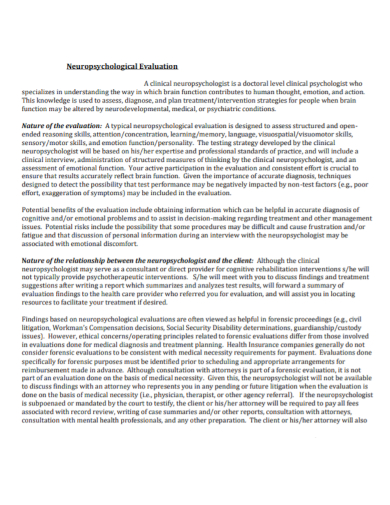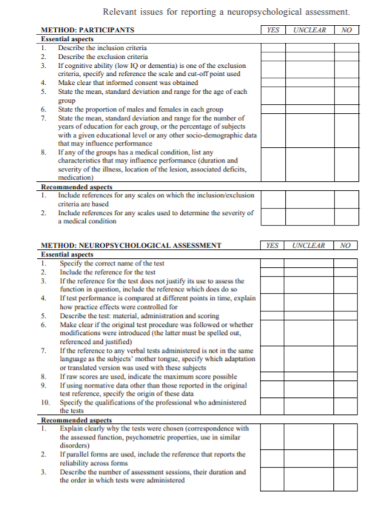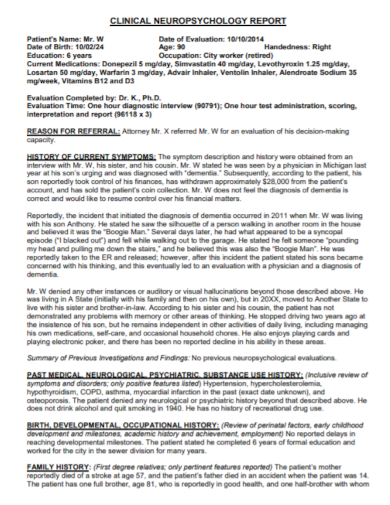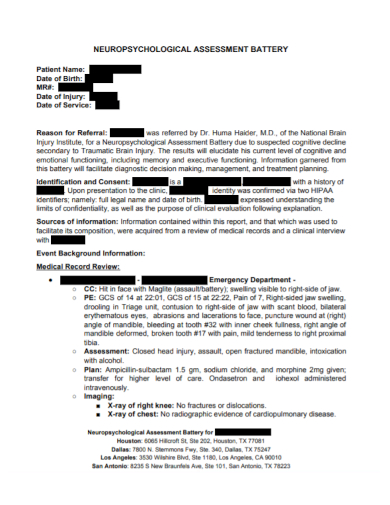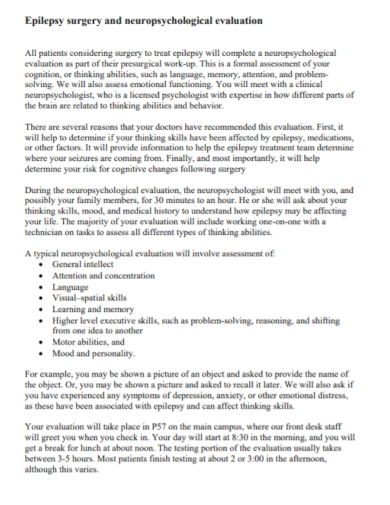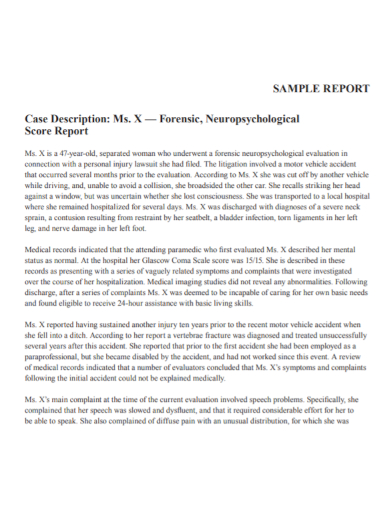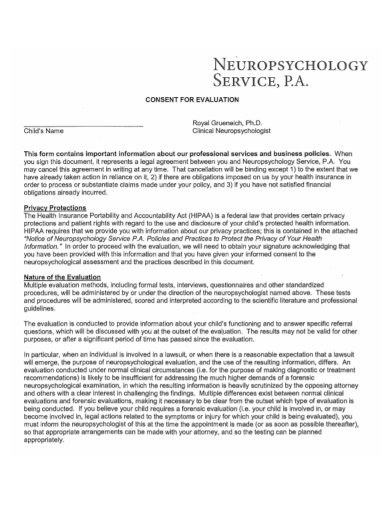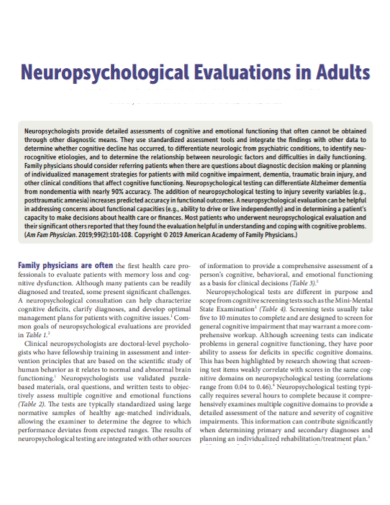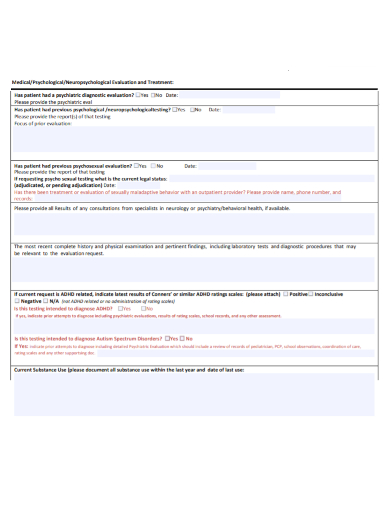In order to closely monitor and evaluate a person’s cognitive ability or brain condition, a neuropsychologist should prepare a neuropsychological report. This is crucial when performing an in-depth evaluation of a patient’s neuropsychological condition. Are you a person who is currently studying neuropsychology? Then, one of the things you need to consider is being able to create a clear and structured neuropsychological report. In this article, we will discuss beneficial steps in writing your clinical evaluation report, plus several downloadable evaluation report templates for you to use. Keep on reading!
FREE 8+ Neuropsychological Evaluation Report Samples
1. Clinical Neuropsychological Evaluation Report
2. Neuropsychological Assessment Report
3. Clinical Neuropsychological Report Format
4. Neuropsychological Assessment Battery Report
5. Neuropsychological Surgery Evaluation Report
6. Neuropsychological Evaluation Score Report
7. Neuropsychological Consent Evaluation Report
8. Neuropsychological Adult Evaluation Report
9. Neuropsychological Evaluation Treatment Report
What is a Neuropsychological Evaluation Report?
A neuropsychological evaluation report is a useful professional document or a comprehensive clinical evaluation report that contains measurements and diagnosis of a patient’s brain function. Conducting observations, analyses, and examinations is vital to measure their attention span, learning ability, reasoning skill, reading skill, processing speed, language usage, problem-solving, remembering, mood and personality, and other areas.
Moreover, a licensed neuropsychologist, or a neuropsychology practitioner carefully analyzes and assesses a person in various areas such as academic skills, attention, socio-emotional function, problem solving, memory, IQ, language, and visual-spatial skills. Then, the doctor writes the medical test report concerning the patient’s neuropsychological condition.
How to Create a Neuropsychological Evaluation Report
Creating a clear, well-detailed, neuropsychological evaluation report is very useful while formulating a diagnosis for your patient and documenting his or her progress while undergoing neuropsychological therapy or treatment sessions. Thus, you should use direct words and clear sentences while interpreting the condition of your patient’s cognitive health.
In this matter, we suggest that you follow the steps below while freely using one of our neuropsychological testing report templates in this article:
1. Evaluate your patient’s appearance, behavior, and attitude
According to the book “The Neuropsychiatric Mental Status Examination”, all the patient’s behaviors are crucial for consideration in the mental status examination but the patient’s general appearance is the first behavioral area that must be evaluated.
One of the main factors that you need to consider in creating a neuropsychological report is evaluate and create an analysis of the overall appearance, behavior, and attitude of your patient.
2. Ask about their feelings, and thoughts in their daily lives
Then, ask the patient to fill out some questionnaires containing some evaluation questions about their past and present feelings, thoughts, and ideas about their daily lives. Be consistent and ensure that your patient feels safe and comfortable during the neuropsychological evaluation.
3. Use a comprehensive assessment of cognitive ability
The next step is you must use a comprehensive test or assessment in measuring your patient’s cognitive abilities. Cognitive ability assessments assess how well individuals use an extensive range of mental processes such as intellectual functioning (IQ), solving mathematical problems, abstract thinking, emotional and behavioural functioning, verbal and visual memory, visual-motor and fine motor coordination, language skills, etc.
4. Formulate a diagnosis
Work collaboratively with the parent or guardian of the patient and other members of the patient’s treatment team. You should observe a patient’s experiences of certain feelings, and behaviors, the duration of time he or she has been experiencing these things, and the impact it has on the patient’s life. Interpret clearly your patient’s current state of mind and formulate a diagnosis according to the history, evaluation, and investigation.
FAQ
A neuropsychological evaluation test should observe and examine the patient’s decision-making capacity who acquired a cognitive impairment. The doctor needs to measure the patient’s consciousness and attentiveness level, motor and speech activity, mood, thought and perception, attitude and insight, and higher cognitive skills. What are the main components of a neuropsychological evaluation test?
It is commonly called a mini-mental state examination or Folstein test. This type of test is being widely used in various clinical and research settings in measuring if a person has cognitive impairment. What is the 30 question cognitive test?
A psychological evaluation usually aimed on determining and diagnosing a specific psychiatric or mental health disorder. On the other hand, a neuropsychological evaluation is the most in-depth type of evaluation as it goes higher to discern the relationship between cognitive, behavioral, and functional deficits and underlying brain functions.What is the difference between a psychological evaluation and a neuropsychological evaluation?
Some common symptoms of neuropsychological illness are mood disturbances, learning difficulties, memory difficulties, nervous system dysfunction, and others.What are the common symptoms of neuropsychological illness?
For this reason, you need to keep practicing your skills and abilities in presenting and interpreting data for psychotherapy patients. Although you encounter some hardships in performing several mental health and neuropsychological evaluation tests, as well as treating your patients’ cognitive disorders, you can be confident in writing a good neuropsychological evaluation report. You just need to follow the aforementioned steps in this article. So, you can select from a wide array selection of evaluation report templates here and get an evaluation report sample today!
Related Posts
Sample Technical Reports
Sample Security Incident Reports
Trip Report Samples & Templates
Sample Book Report Templates
Sample Chemistry Lab Reports
School Accomplishment Report Samples & Templates
Field Report Samples & Templates
Sample Science Project Reports
Business Report Samples & Templates
Survey Reports Samples & Templates
Sample Feasibility Reports
Report Format Samples & Templates
Acknowledgement for Internship Report Samples [ Hotel, Hospital, Teaching ]
Field Trip Report Samples [ Agriculture, Educational, Environmental ]
Student Counseling Report Samples

